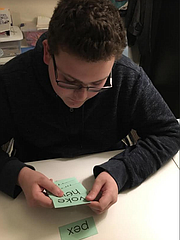A frustrating disorder
Early in life, Alyssa Pukkila knew she had trouble with words.
"I learned to read, but I was a horrendous speller," she said Tuesday afternoon.
This issue heavily weighed on her when she was an undergraduate student.
"One semester I went to get all my reading material. It was so much," she said. "I went to the corner of the book store and just cried. I read so much slower than my peers."
Pukkila, of Post Falls, has a son who was diagnosed with dyslexia when he was in the third grade. It wasn't until she dived into research and dedicated herself to dyslexia education and training that she realized it's something that affected her, too.
"Dyslexia runs in the family," she said. "I didn't know it was my problem."
Dyslexia is commonly categorized as a learning disorder or language-based disability. Pukkila, an educational therapist and founder of the Wired2Learn NeuroEducation Clinic in Post Falls, describes it as "an auditory processing glitch"
"They're not processing the sound well," she said. "They're hearing it fine, but it hits the neurological system and they struggle."
Those who have the disorder may read the word "utensil" as "untensil" or mix up the words "symphony" and "sympathy."
Many people believe it is only flipping letters, Pukkila said, but "at the core, it's an auditory processing problem."
"They struggle to understand with phonics the letter combinations and the sounds that they make," she said. "That’s why you see problems with reading and decoding. It's sounding out a word; they won’t be able to sound it out because they don't know all the phonics involved."
Dyslexia can be mild and manageable or severe and require special education. It is a complex disorder that has many layers. It is sometimes accompanied by other conditions, making it difficult to diagnose.
"It's very common," Pukkila said. "When we're talking about kids with reading issues, we’re looking at one in five. But ... it could be more complicated."
Pukkila and her family have been in North Idaho for 24 years. Without any local dyslexia awareness chapters or programs specific to this disorder to support her as a parent, she took the charge to be that support for other families in a similar situation.
She founded Wired2Learn in 2009 to provide specialized therapeutic services and programs to children and adults with learning disabilities.
Hayden mom Erica Smith has brought her son, Ryan, 11, to the clinic for two years. They work on syllable drills and other tutoring sessions to help him learn what he couldn't at a younger age.
Ryan was first diagnosed with attention-deficit/hyperactivity disorder around the third grade, but Smith knew it had to be something else — Ryan was leaving vowels out of words, unable to work on word searches and struggling with reading in general.
She took him to an ADHD and dyslexia specialty center in Spokane, where he was diagnosed with dyslexia and dysgraphia, a condition that hinders one's written expression.
"He has all these great thoughts," Smith said. "He just can't get them on paper."
Smith said it is discouraging for Ryan to fall behind his peers when he just has a different way of learning.
"In an education setting, he was definitely labeled as a slow kid," she said. "It wasn't warranted because had he been given the proper tools, he's smarter or just as smart as the kids in his class."
Ryan has an individualized education plan (IEP) that informs his teachers of his disorder. She said he regularly aces tests that are administered orally, and when she meets with faculty members about his IEP, they always have high remarks about him.
"I don’t think there’s anything wrong with him, and you wouldn't either if you just saw him on the street," she said. "It’s very frustrating for him to go to school and get an 'F' on something and he knows the material and he knows he would have gotten it if it was done a different way."
Dyslexia does get in the way of a person's ability to process words, but it has nothing to do with a person's intellect.
"Dyslexia is extremely frustrating for anyone who’s going through it because your IQ is normal. Many, many times you’re actually gifted," Pukkila said. "You’re this smart kid trapped with this inability to do what your peers are doing. You don't want to read because it's so difficult. The letters don't seem to make any sense."
A few famous dyslexia sufferers are English billionaire Sir Richard Branson, Academy Award-winning director Steven Spielberg, Princess Victoria of Sweden and basketball superstar Earvin "Magic" Johnson. It is speculated that visionaries such as Thomas Jefferson, Thomas Edison and Leonardo da Vinci also struggled with the condition.
Branson is open about his lifelong challenges with dyslexia. According to a recent Silicon Republic article, he was told by his headmaster on his final day of school that "he would either go to prison or end up a millionaire."
"Richard Branson has dyslexia and ADHD, but he’s learned to harness the strength in both of those," said Pukkila, whose son has overcome his struggles and is now studying to be a chemical engineer at the University of Idaho.
"A lot of dyslexics have tenacity, which we know is more important than IQ in terms of success," she said. "It is a unique way the brain is set up to process information. There is a whole bunch of wonderful brains in a dyslexic kiddo or adult, and if they can learn to harness those gifts, they can succeed."
For information, visit dyslexiaida.org/dyslexia-basics or www.wired2learn.com.





